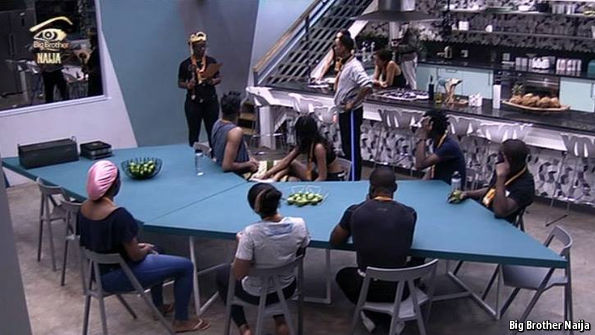
THE Nigerian edition of “Big Brother” has the same mix of larger-than-life narcissists, banality and backstabbing found in every other version of the reality-television show. But an extra dose of controversy was added to the fall-outs and flirtations when Nigerians discovered that their programme, in which contestants are locked in a house and filmed 24/7, was being made in South Africa. On January 24th the country’s information minister, Lai Mohammed, opened an investigation into “the issue of possible deceit”, urging those who had “bombarded” his office with complaints to stay calm.
MultiChoice, the production company behind “Big Brother Naija”, was unapologetic, pointing out that it was easier and more cost-effective to stage the show in its existing house in Johannesburg. During the only previous Nigerian edition a sponsor had removed the fuses from the house’s generators in a dispute over advertising, taking the programme off air for eight hours, says Remi Ogunpitan, a producer at the time. Eleven years later Nigeria’s power supply is still erratic, and the price of diesel for generators has more than doubled in the past six months due to supply constraints.
This is just the latest spat between Nigeria and South Africa, as they spar for continental economic supremacy. In 2014 Nigeria leapfrogged its rival to the position of Africa’s largest economy, when its GDP was re-calculated by the government and found to be almost double the previous estimate. But Nigeria, whose population is more than three times South Africa’s, was overtaken again last year because of falling oil prices and the subsequent devaluation of its currency, the naira. In 2015 Nigeria slapped MTN, a South African mobile-phone company, with a billion-dollar fine for failing to disconnect unregistered SIM cards, which it claimed could have been used by the jihadist fighters of Boko Haram. On the cultural front, “District 9”, a South African-directed film released in 2009, depicted Nigerians eating the flesh of, and prostituting themselves to, aliens.
Dystopian sci-fi flicks aside, Nigeria dominates entertainment. Africans devour Nollywood films and Nigerian pop music fills dance floors across the continent. Private companies such as DSTV, a continental satellite TV provider owned by MultiChoice, make everything from soap operas to talent shows in Nigeria. Far from being offended, many Nigerians simply see the bother over “Big Brother” as a wake-up call to their government—and further proof, if any were needed, that their country is a tough place to do business.
END

Be the first to comment